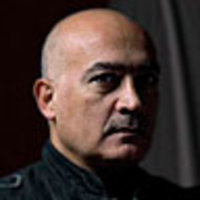
Plus, read more insight on Iran's election from other Daily Beast writers.
The post-election uprising in Iran is receiving near-saturation media coverage in the U.S. and throughout the world, with most of the Western media showing sympathy with the pro-reform popular movement that is putting up the biggest challenge to the Islamic republic since the revolution that toppled the shah in 1979.
But the picture looks different in the Middle East and the Persian/Arabian Gulf region. The Arabic-language satellite-TV channel Al Jazeera, the most influential channel in the Arab world, continues to offer support for the “reinstalled” President Mahmoud Ahmadinejad and the ruling establishment, against rival reformist leader Mir Hossein Mousavi and his supporters.
Foreign journalists are now allowed to continue work in their offices and hotel rooms, but they cannot go out and do any interviews.
In an interview aired yesterday, Al Jazeera’s anchor asked an aide to former reformist President Mohammad Khatami, who supports Mousavi, whether it was wise to support Mousavi and risk being accused of treason and collaboration with the West. He was implying that supporting reform and democracy would label the Iranian opposition as pro-Western, and thus, treason!
This is perhaps why the Qatari government-run and controlled Al Jazeera was allowed to continue work in Iran, while its rival satellite channel, Al Arabiya, was banned. Qatar, home of the largest American military base in the world, is also Iran’s closest ally in the Arab world.
In Syria, another pro-Iran dictatorship, the media was on the side of the government and squarely against the protesters, whom the Tishrin newspaper described as “a fifth column” supported by the West against the popular government.
On Tuesday, Iran banned foreign media from covering protests, a day after the dubious presidential elections ignited deadly clashes. Well-placed sources told me there were six other fatalities among the demonstrators, some of whom were killed by Basij pro-government militia, that Iranian authorities are not reporting. But it was hard to verify the information at the time of writing.
According to various sources, foreign journalists are now allowed to continue work in their offices and hotel rooms, but they cannot go out and do any interviews as the authorities were revoking press accreditation of all foreign media, including Iranians working for the foreign press.
A reporter for the Swedish SVT network had been asked to leave Iran immediately, according to a spokesperson for the network, while Dubai-based Al Arabiya said its correspondent in Tehran was told by Iranian officials that its office would be closed for a week.
In addition to restricting foreign correspondents, Iran also blocked access to certain online communications tools, including filtering out Internet traffic for Twitter and Facebook.
The prominent pan-Arab newspaper Al-Hayat noted an escalation in the protests, especially in Tehran, while the international Asharq Al-Awsat Arab newspaper saw hints of a “counter-revolution” brewing in the streets of Iran.
Iranian bloggers are posting pictures and videos of protesters being attacked by Iranian police, and these are being distributed online all over the world.
The following video shows an Iranian youth being beaten up and dragged through the streets:
Another shows two Iranian police officers beating and abusing a teenager:
The Arab media generally appeared to play down the tumultuous events in Iran the first two days, but it caught up with the coverage on the second day of the protests after it became clear that the story was not a simple protest that was going to die away. Most of the Arab media is directly or indirectly controlled by undemocratic governments, who are not too eager to show anti-government protests or democracy movements that may give their people similar ideas.
In Israel, the media is playing up statements made by Mossad intelligence chief Meir Dagan expressing doubt that the unrest in Iran would lead to a regime change or alleviate concerns about Tehran’s atomic program.
According to the Israeli Haaretz English-language newspaper, Dagan told lawmakers in a closed-door briefing that “Iranian reality isn’t about to change following the elections. Will there be a revolution? I doubt it,” added Dagan, a veteran of the agency that keeps a close watch on the Islamic republic.
Overall, the media in democratic countries appear to be supporting the pro-democracy movement in Iran, while dictatorships and authoritarian regimes are on the other side.
The battle lines have been drawn in the media, but the Obama administration appears to be on the fence, deliberately avoiding outright support for the uprising in Iran, fearing that may backfire and hurt the cause of the reformists and American interests.
Obama is behaving as though he’s playing chess—a game invented by ancient Persians. His next move will depend on the next move by the authorities in Tehran and the reaction to that move by the opposition.
Salameh Nematt is the international editor of The Daily Beast. He is the former Washington bureau chief for the international Arab daily Al-Hayat, where he reported on U.S. foreign policy, the war in Iraq, and the U.S. drive for democratization in the broader Middle East.






